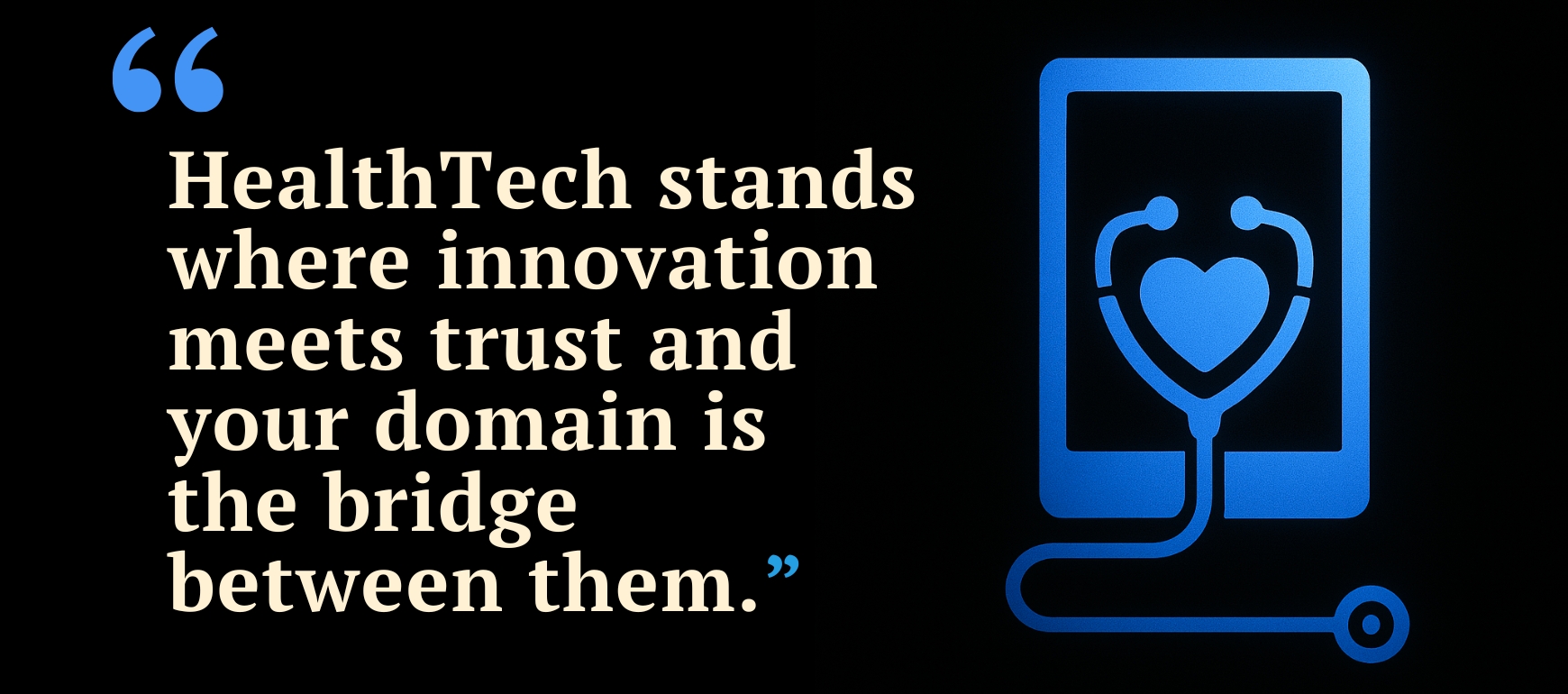HealthTech lives at the intersection of innovation and trust. When a startup claims it can detect disease, manage chronic conditions, or transform care delivery, the domain you type into your browser becomes part of that promise.
A deep dive into over 300 HealthTech companies reveals naming patterns that separate signal from noise. These are clues to how investors and users filter trust, credibility, and future potential.
What the Data Reveals
| Pattern | Metric | Why It Matters |
|---|---|---|
| .com dominance | 287 out of 310 use .com domains | Even in a tech-centric sector, familiarity remains foundational. |
| Exact Brand Match (EBM) | 234 of 310 own their exact brand name domain | No modifiers, no extras - just the name people heard and expect. |
| Hyphens | Only 3 healthtech brands use hyphenated domains | Hyphens fragment visual memory and introduce typo risk. |
| Descriptive vs abstract | Many combine medical / “care / med / bio” terms; others use short abstract names | Clarity helps in crowded spaces; flexibility helps with scale and pivoting. |
| Personal + human names | Brands like Ezra, Ava, Zoe use human or personal names to convey care and connection | Health is personal - naming that underscores that stands out. |
Source: SmartBranding.com
Key Lessons for HealthTech Founders & Investors
1. Trust Starts with the Domain
If you’re asking people to share health data, trust must be intangible yet visible. A clean, exact-match .com domain reduces friction. When domain and brand align, users don’t hesitate at entering URLs, clicking links, or trusting emails.
2. Descriptors Can Help But May Limit You
A domain that includes “med”, “care”, “bio”, or “health” signals what you do. But if your roadmap includes diagnostics, lifestyle, AI-enabled monitoring, or wellness avoid locking your identity into one vertical.
3. Hyphens & Modifiers Are Executional Drag
Names like My-HealthApp.com or HealthTechSolutions.com may feel descriptive, but they drag in user memory. One slip (and hyphens are hard to type) can send people to competitors, broken links, or confusion. In health, confusion kills trust.
4. Personal & Abstract Names Work Strongly in Health
Your product might be clinical, but your brand doesn’t have to feel robotic. Names like Ezra, Ava, Zoe humanize health making your brand feel more accessible. At the same time, having a strong domain backing it (Ezra.com, Zoe.com) turns relatability into credibility.
5. Domain Upgrades Cost More Than You Think
Later domain changes or upgrades cost more than money: you lose SEO authority, break existing links and integrations, confuse users, and force a re-education. The best time to negotiate or partner for your ideal domain is early, before those costs compound.
How Founders Should Use This Insight
• Begin with the name that captures your vision and values then map domain negotiation or acquisition around it.
• If the ideal domain is out of reach, approach owners with equity, hybrid or partnership models rather than all-cash offers.
• Protect your brand by registering variations, mis-spellings, and relevant TLDs (e.g. .health, .ai) early, even if you don’t use them.
• Don’t neglect the human element - your domain should also reflect how people talk about your brand in everyday terms.
Platforms like ours exist to facilitate exactly this kind of collaboration: founders meeting domain owners willing to trade upside instead of cash. It bridges capital constraints and strategic naming.
Takeaway
In HealthTech, your domain is structural. It shapes trust, perception, and access.
Before you raise, launch, or expand make sure your name is speaking on your behalf.
Own a Great Domain Name? Or Looking for One to Build On?
DomainsForEquity connects founders, investors, and domain name owners in creative partnerships.
Post a Domain Name or Request a Domain Name - and find the right partner to grow your next big brand.


 by Tatiana
by Tatiana